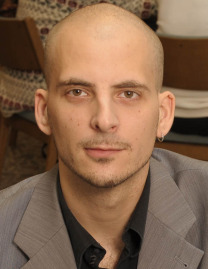AMES, Iowa – Reality TV has a way of highlighting the worst in people, even when they genuinely think they’re doing their best. American Idol is just one example, in which contestants who can’t carry a tune are shocked when told they can’t sing. Zlatan Krizan, an associate professor of psychology at Iowa State University, says it’s a natural reaction because we have a hard time accurately evaluating our abilities.
People often think they are good at their job or have a talent, such as singing, because of the feedback they receive from employers, family and friends. Too often that feedback is vague and does not offer any suggestions for improvement, Krizan said. It is much easier to tell someone they are doing a good job instead of being honest and risk hurting their feelings.
“This is one reason why we have barriers to self-insight, because oftentimes, even if we get feedback, it’s not accurate,” Krizan said. “As a society we make the wrong trade-off by thinking that boosting self-esteem is going to boost performance, and that rarely happens. That empty praise of telling someone they’re great, or pretending there are not skill differences when there are, can really become a problem.”
These misguided perceptions of ability can affect everything from career choice to relationships. If someone has an inflated perception of their abilities, they may pursue a career for which they are not qualified. Krizan and Ethan Zell, a professor at the University of North Carolina-Greensboro, conducted a meta-synthesis of previous research to see how self-insight relates to different abilities.
Meta-synthesis is a statistical technique that capitalizes on a large amount of information often available when scientific questions have already been addressed by numerous studies across multiple disciplines. In this case, researchers pooled together large sets of data that examined correlations between actual abilities and beliefs about those abilities for more than 330,000 individuals.
The study, published in the journal Perspectives on Psychological Science, found people have better self-insight of specific skills or tasks with a defined measurement. Speaking a foreign language is a good example of a skill we can determine with high accuracy. You can immediately assess your ability when trying to talk with someone who speaks the language fluently.
With less precisely defined self-evaluations, such as athletic ability, self-insight may be more challenging. People will focus on areas in which they excel and downplay their weaknesses, Krizan said. For example, someone may be good at basketball, but claim to be a good athlete even though they do not perform well in many other sports. We are also less accurate when the task is complex or requires multiple skills.
That’s why the American Idol contestants – who insist their friends always tell them they’re good singers – can’t understand why the judges don’t agree. If they can’t distinguish pitch with their ear, they will have no idea whether or not they’re singing on pitch, Krizan said. He often sees this phenomenon with students who perform poorly on an exam.
“Your expectations going into a performance will influence your experience,” Krizan said. “Students will get their exams back and say, ‘but I felt so good after the test.’ Well, if you don’t understand the material, it’s hard for you to gauge whether you’re giving right or wrong answers on a test.”
Evaluation of abilities matters in the workplace
We all make judgments or compare people based on what they tell us about their abilities. Employers rely on accurate assessments when making a decision between two candidates for a job opening. If one of the candidates overestimates his or her abilities it could skew the outcome of the search.
The same applies to team projects in the workplace. Co-workers split up the workload based on the talents of others on the team. People who are good at evaluating their abilities will perform well in the roles they are assigned. Team members who fail to deliver may need to re-assess their abilities. That is why Krizan recommends setting specific measures for evaluation and feedback.
“This will lead people to consider the things they’ve done and the outcomes, which will be more closely connected to real performances versus broad ideas of competency,” Krizan said. “If people are evaluating themselves in terms of very specific criteria, they’re going to have better self-insight because they are constrained by how to interpret the ability.”
Benefits of meta-synthesis for big data
Aside from the study results, Krizan said other researchers can benefit from using the meta-synthesis method. He and Zell critiqued nearly two dozen meta-analyses that examined self-evaluation. The existing research encompassed a variety of skills and abilities so that it could be applied to broader questions about self-insight. Krizan says this type of analysis is a way to use the volume of big data that already exists.
“There is a huge amount of information on human behavior. One problem we face as a science is using this data,” Krizan said. “This is a way to get scientifically based answers for some of these big questions by taking advantage of all these studies that are already done and often in different fields.”
Because the method synthesizes so much data, Krizan says it is hard to argue with the conclusions. By aggregating several research studies and different populations across hundreds of thousands of individuals, researchers can make generalizations that they cannot with other studies.
